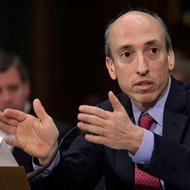 Yuri Gripas/ReutersGary Gensler, the Commodity Futures Trading Commission chairman, testified last week before the Senate agriculture committee.
Yuri Gripas/ReutersGary Gensler, the Commodity Futures Trading Commission chairman, testified last week before the Senate agriculture committee.
Federal regulators approved tougher constraints on Wall Street risk-taking on Monday, adopting the “MF Global rule,” named after the collapsed brokerage firm that is believed to have improperly used hundreds of millions of dollars of customer money.
The new rule will limit how the brokerage industry can invest customer money, largely barring firms from using client funds to buy foreign sovereign debt. It also prevents a complex transaction that allowed MF Global, in essence, to borrow money from its own customers.
The Commodity Futures Trading Commission, which voted unanimously to approve the rule, originally planned to finalize it months ago.
But the agency delayed action as a result of strong opposition from Jon S. Corzine, who at the time was chief executive of MF Global. Mr. Corzine resigned on Nov. 4, four days after MF Global filed for bankruptcy protection.
“I believe that this rule is critical for the safeguarding of customer money,” Gary Gensler, the agency chairman, said at a public meeting in Washington.
The revelation that client money was missing at MF Global has incited panic in the once-quiet futures industry. MF Global’s customers, including farmers, hedge funds and other investors, are still owed millions of dollars.
Now, some customers say they are losing faith in a system that promised to protect their money. While brokerage firms can invest client money, such funds must never be comingled with company funds.
MF Global violated that principle in its final chaotic days, tapping its segregated client accounts to meet its own financial obligations, people briefed on the matter have said. About $200 million in customer money that disappeared from MF Global surfaced at one point at JPMorgan Chase in Britain, the people said.
The missing money, thought to be as much as $1.2 billion, has prompted several federal investigations in recent weeks. The futures commission is leading the hunt for the money, while the Federal Bureau of Investigation is examining potential wrongdoing.
Some regulators are also examining a flood of new rules for brokerage firms, part of an effort to prevent a repeat of the MF Global debacle.
The Securities and Exchange Commission is weighing new accounting disclosures for the industry.
MF Global’s collapse has also led to renewed calls for federal regulators to keep a closer watch of brokerage firms, reclaiming oversight authority now delegated to for-profit exchanges like the CME Group.
Bart Chilton, a Democratic member of the Commodity Futures Trading Commission, is pushing for Congress to create an insurance account for futures industry customers similar to the Federal Deposit Insurance Corporation’s fund.
The rule adopted by the futures commission on Monday is aimed at the industry’s use of customer money. While firms can invest customer funds in United States Treasury securities, money markets and other plain-vanilla funds, the agency reined in some riskier bets.
Until now, brokerage firms could invest client money in a number of securities, including sovereign debt. Under the administration of President George W. Bush, regulators gradually lengthened the list of permitted investments.
But under the new rule, if firms want to invest customer funds in foreign government bonds, they must petition the agency for a special exemption. The new rule also bars firms from using client money so that one arm of the company can lend to another, a complex transaction known as an in-house repurchase agreement.
“I believe there is an inherent conflict of interest between parts of a firm doing these transactions,” Mr. Gensler said. Mr. Gensler’s agency initially proposed the crackdown in October 2010, and neared a vote on the plan this summer.
But at the time, the agency met a powerful roadblock in Mr. Corzine, former Democratic governor of New Jersey.
The rules were unnecessary, Mr. Corzine said, because federal laws already prevented brokerage firms from mixing client money with company funds. In a letter, MF Global insisted to regulators that they were trying to “fix something that is not broken.”
Mr. Corzine’s efforts culminated on July 20, as MF Global executives were on four different calls with the agency’s staff. Mr. Corzine personally participated in two of those calls. Ultimately, the aggressive lobbying campaign helped delay the proposal.
But in the wake of MF Global’s collapse, the agency’s commissioners moved quickly to adopt the new constraints. The agency voted 5-0 on Monday for the rule, drawing support from two Republican commissioners who have opposed many new rules for Wall Street, signifying the seriousness of the MF Global situation.
“As recent events have highlighted, the protection and preservation of customer funds is fundamental to our markets,” Scott O’Malia, a Republican member of the commission, said in a statement. “By limiting investments of customer funds to a subset of instruments that currently have minimal risk, this final rule is a step towards enhancing customer protection.”
Article source: http://feeds.nytimes.com/click.phdo?i=9d57d7b171ea1bae8f184f13b16cfc73
Speak Your Mind
You must be logged in to post a comment.